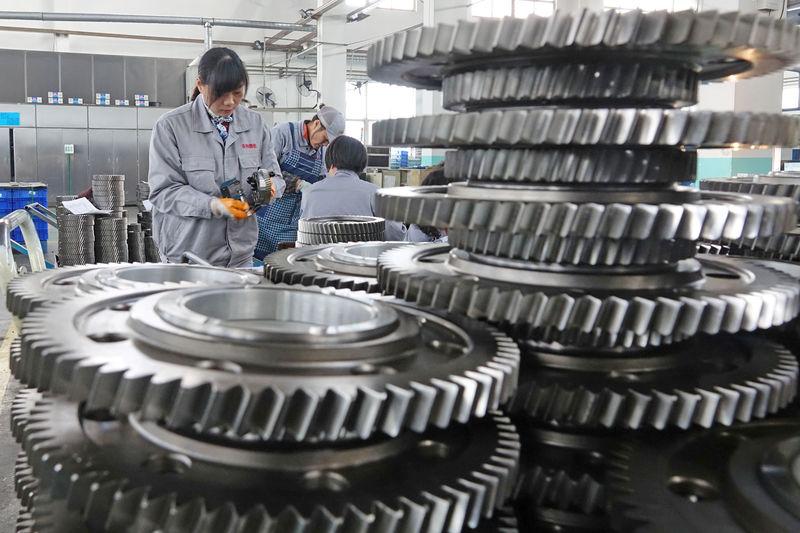BEIJING (Reuters) - China's factory activity grew slightly in November, a private survey showed, though new export orders extended their decline in a further blow to the sector already hurt by the Sino-U.S. trade frictions.
The Caixin/Markit Manufacturing Purchasing Managers' Index (PMI) for November, released on Monday, ticked up to 50.2 from 50.1 in October. Economists polled by Reuters had forecast a reading of 50.0, the level that separates expansion from contraction.
Domestic orders have been losing momentum in recent quarters as the world's second-largest economy slows. Overall, a sub-index measuring new orders did improve slightly to 50.9 in November from 50.4 in the previous month, after manufacturers cut prices.
Exports have held up so far, but the lingering threat of higher U.S. tariffs next year amid a trade war with the United States, China's No.1 trade partner, remained a drag on Chinese manufacturing.
That risk was underscored by the sub-index for new export orders shrinking to 47.7 in November from 48.8 a month earlier, amid relatively weak global demand conditions, according to the survey.
Over the weekend, on the sidelines of the G20 summit in Argentina, China and the United States agreed to suspend additional tariffs in a deal that keeps their trade war from escalating for now.
Trump said he would not increase tariffs on $200 billion of Chinese goods to 25 percent on Jan. 1 as previously announced, with the two sides aiming to reach an agreement within 90 days.
"Sentiment among exporters may improve during the next couple of months thanks to the tariff ceasefire agreed to by Trump and Xi over the weekend," Julian Evans-Pritchard, senior China economist at Capital Economics, wrote in a note.
"While this may help to buoy the PMIs temporarily, we doubt it will prevent China's economy from slowing in the coming quarters."
A more immediate worry for Chinese manufacturers is weak domestic demand.
(GRAPHIC: China economic indicator dashboard - http://tmsnrt.rs/2iO9Q6a)
The Caixin survey showed ebbing client orders weighing on China's factory output, which stalled in November after months of expansion, the survey showed.
To counter weaker domestic demand, manufacturers cut prices for the first time in more than a year and a half. But that was not enough to prevent a rise in inventories, the first increase since April.
The output prices sub-index fell below the 50-mark to 49.8 in November, boding ill for profit margins. Profit growth at China's industrial firms slowed for a sixth month in October, according to the latest official data.
The gauge on overall production fell to 50.0 from 50.1 in the previous month.
The downbeat readings backed Friday's official PMI survey for November showing growth in the nation's vast factory sector sliding to over a two-year low.
With client demand muted, an effort to contain operating costs led Chinese manufacturers to further reduce staff, while confidence toward the year ahead stayed subdued, according to the survey.
The employment sub-index slipped to 48.4 in November from 48.8 in October.
One bright spot - average input costs grew at their slowest pace in seven months.
Yet the trade frictions with the United States obscured the outlook for China's economy, which has been slowing this year and is widely expected to cool further in 2019.
The United States and China have levied tariffs on billions of dollars of each other's goods this year.

(This story corrects month in headline to November, not October)